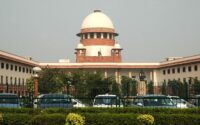Justice On Sale: The hefty court fees
Today, we will discuss something that isn’t discussed often whenever we talk about the Indian Legal System. It is the heavy court fees we pay in order to get justice. The court fee was introduced in 18th Century for the first time in presidency towns: Madras, Bengal and Bombay. The intention behind charging such fees is to deter litigants from approaching the courts. By 1870, it was seen that the scheme had succeeded in achieving the desired result.
In post-independence period, there were some changes. By the incorporation of the seventh schedule in the constitution, the powers to impose tax and fees had been divided between the states and the union. However, this point should be given a little extra attention that we had freed ourselves from the shackles of the tyrannical British rule, but not from the tyrannical laws. Nothing changed, the people still paid to get privilege of being of heard. The only change was that the justification of imposing the fee had changed from deterring the litigants, to backing up the justice administration. The fee collection would go to the consolidated fund of the state.
There were various factors of determining the fee; generally, it is determined by the amount of relief asked for or the immovable property involved in the litigation. So, if a person wants to repudiate a contract or want to evict a trespasser from his land, or any sort of legal dispute, then he would have to pay from 3 to 10 of the value of the suit. In any such suit of private nature, the ultimate concern of the court is to reinstate the litigant to its earlier stage. It ensures that the litigant merely recovers his loss, and get no scope to gain profit out of the litigation. However, the courts don’t consider the court fee as loss, which the litigant wouldn’t have borne if there is no suit.
No doubt, the question would spring up in your mind that then who would pay the court fee if not us? Questions similar to that was raised by the 14th Law Commission of India and found out that the court fee from civil litigation brought enough funds to clear the expenses incurred in criminal litigation and salaries of judicial staff. In case, if the court fees weren’t enough to bear the expenses of civil litigation itself, still doesn’t it that courts provide services to the criminal litigants or the people approaching the High Court to safeguard their fundamental rights? So, as opined by the Law Commission that the fee should be in the proportion to the services rendered.
The Supreme Court has also showed its concern on the same matter. In 1980, Justice Krishna Iyer observed that court fees are imposed on “such a profiteering scale without correlative expenditure on the administration of civil justice that the levies often smack of sale of justice in the Indian Republic.”. Since then, the courts have become cautious on this matter. The situation demands reconsideration, as justice is one of the essential parts of a human life. The state cannot do business of providing justice.
By:-
Adhiraj Joshi


